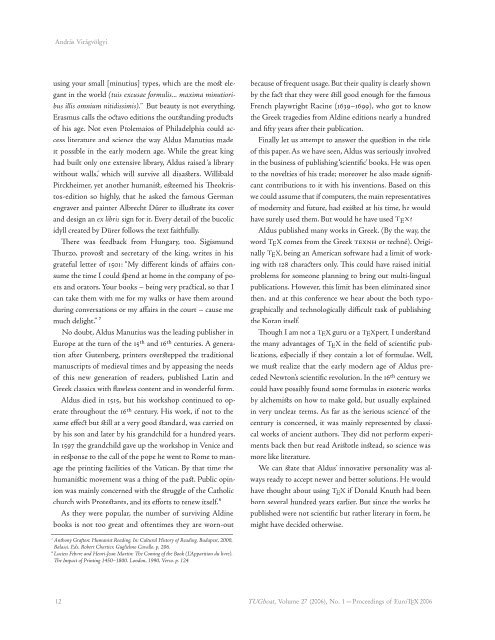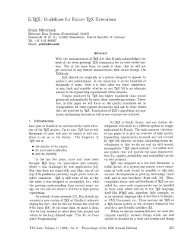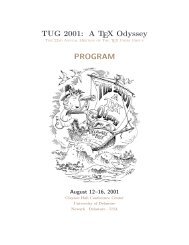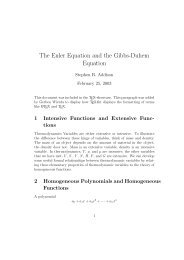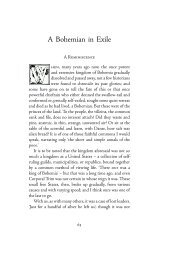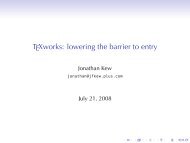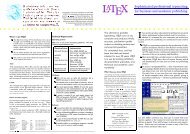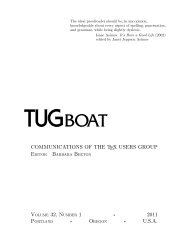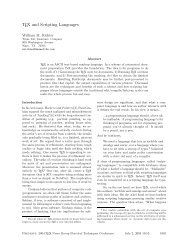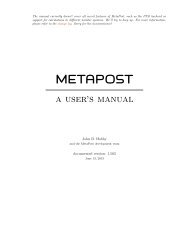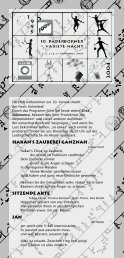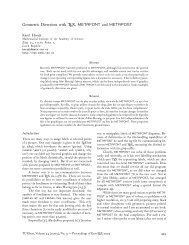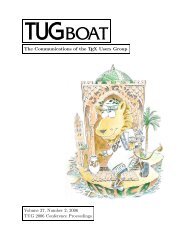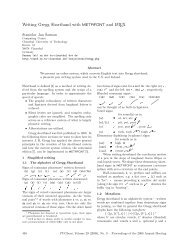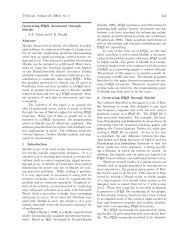The Communications of the TEX Users Group Volume 27 ... - TUG
The Communications of the TEX Users Group Volume 27 ... - TUG
The Communications of the TEX Users Group Volume 27 ... - TUG
You also want an ePaper? Increase the reach of your titles
YUMPU automatically turns print PDFs into web optimized ePapers that Google loves.
András Virágvölgyi<br />
using your small [minutius] types, which are <strong>the</strong> mo� elegant<br />
in <strong>the</strong> world (tuis excusae formulis... maxima minutioribus<br />
illis omnium nitidissimis).” But beauty is not every thing.<br />
Erasmus calls <strong>the</strong> o� avo editions <strong>the</strong> out� anding produ� s<br />
<strong>of</strong> his age. Not even Ptolemaios <strong>of</strong> Philadelphia could access<br />
literature and science <strong>the</strong> way Aldus Manutius made<br />
it possible in <strong>the</strong> early modern age. While <strong>the</strong> great king<br />
had built only one extensive library, Aldus raised ‘a ‘ library<br />
without walls,’ which will survive all disa� ers. Willibald<br />
Pirckheimer, yet ano<strong>the</strong>r humani� , e� eemed his � eokristos-edition<br />
so highly, that he asked <strong>the</strong> famous German<br />
engraver and painter Albrecht Dürer to illu� rate its cover<br />
and design an ex libris sign for it. Every detail <strong>of</strong> <strong>the</strong> bucolic<br />
idyll created by Dürer follows <strong>the</strong> text faithfully.<br />
� ere was feedback from Hungary, too. Sigismund<br />
� urzo, provo� and secretary <strong>of</strong> <strong>the</strong> king, writes in his<br />
grateful letter <strong>of</strong> 1501: “My di� erent kinds <strong>of</strong> a� airs consume<br />
<strong>the</strong> time I could � end at home in <strong>the</strong> company <strong>of</strong> poets<br />
and orators. Your books – being very pra� ical, so that I<br />
can take <strong>the</strong>m with me for my walks or have <strong>the</strong>m around<br />
during conversations or my a� airs in <strong>the</strong> court – cause me<br />
much delight.” �<br />
No doubt, Aldus Manutius was <strong>the</strong> leading publisher in<br />
Europe at <strong>the</strong> turn <strong>of</strong> <strong>the</strong> 15�� and 16�� centuries. A generation<br />
after Gutenberg, printers over� epped <strong>the</strong> traditional<br />
manuscripts <strong>of</strong> medieval times and by appeasing <strong>the</strong> needs<br />
<strong>of</strong> this new generation <strong>of</strong> readers, published Latin and<br />
Greek classics with fl awless content and in wonderful form.<br />
Aldus died in 1515, but his workshop continued to operate<br />
throughout <strong>the</strong> 16�� century. His work, if not to <strong>the</strong><br />
same e� e� but � ill at a very good � andard, was carried on<br />
by his son and later by his grandchild for a hundred years.<br />
In 1597 <strong>the</strong> grandchild gave up <strong>the</strong> workshop in Venice and<br />
in re� onse to <strong>the</strong> call <strong>of</strong> <strong>the</strong> pope he went to Rome to manage<br />
<strong>the</strong> printing facilities <strong>of</strong> <strong>the</strong> Vatican. By that time <strong>the</strong><br />
humani� ic movement was a thing <strong>of</strong> <strong>the</strong> pa� . Public opinion<br />
was mainly concerned with <strong>the</strong> � ruggle <strong>of</strong> <strong>the</strong> Catholic<br />
church with Prote� ants, and its e� orts to renew itself.�<br />
As <strong>the</strong>y were popular, <strong>the</strong> number <strong>of</strong> surviving Aldine<br />
books is not too great and <strong>of</strong>tentimes <strong>the</strong>y are worn-out<br />
7 Anthony Grafton: Humanist Reading. In: Cultural History <strong>of</strong> Reading. Budapest, 2000,<br />
Balassi. Eds. Robert Chartier, Guglielmo Cavallo. p. 206.<br />
8 Lucien Febvre and Henri-Jean Martin: � e Coming <strong>of</strong> <strong>the</strong> Book (L’Apparition du livre).<br />
� e Impact <strong>of</strong> Printing 1450–1800. London, 1990, Verso. p. 124.<br />
<strong>TUG</strong>Boat, volume 24 (2006), No. 3 – Proceedings <strong>of</strong> Euro TeX 2006<br />
because <strong>of</strong> frequent usage. But <strong>the</strong>ir quality is clearly shown<br />
by <strong>the</strong> fa� that <strong>the</strong>y were � ill good enough for <strong>the</strong> famous<br />
French playwright Racine (1639–1699), who got to know<br />
<strong>the</strong> Greek tragedies from Aldine editions nearly a hundred<br />
and fi fty years after <strong>the</strong>ir publication.<br />
Finally let us attempt to answer <strong>the</strong> que� ion in <strong>the</strong> title<br />
<strong>of</strong> this paper. As we have seen, Aldus was seriously involved<br />
in <strong>the</strong> business <strong>of</strong> publishing ‘scientifi ‘ c’ books. He was open<br />
to <strong>the</strong> novelties <strong>of</strong> his trade; moreover he also made signifi -<br />
cant contributions to it with his inventions. Based on this<br />
we could assume that if computers, <strong>the</strong> main representatives<br />
<strong>of</strong> modernity and future, had exi� ed at his time, he would<br />
have surely used <strong>the</strong>m. But would he have used <strong>TEX</strong>?<br />
Aldus published many works in Greek. (By <strong>the</strong> way, <strong>the</strong><br />
word TE T X comes from <strong>the</strong> Greek ����� or techné). Originally<br />
TE T X, being an American s<strong>of</strong>tware had a limit <strong>of</strong> working<br />
with 128 chara� ers only. � is could have raised initial<br />
problems for someone planning to bring out multi-lingual<br />
publications. However, this limit has been eliminated since<br />
<strong>the</strong>n, and at this conference we hear about <strong>the</strong> both typographically<br />
and technologically di� cult task <strong>of</strong> publishing<br />
<strong>the</strong> Koran itself.<br />
� ough I am not a TE T X guru or a TE T Xpert, I under� and<br />
<strong>the</strong> many advantages <strong>of</strong> TE T X in <strong>the</strong> fi eld <strong>of</strong> scientifi c publications,<br />
e� ecially if <strong>the</strong>y contain a lot <strong>of</strong> formulae. Well,<br />
we mu� realize that <strong>the</strong> early modern age <strong>of</strong> Aldus preceded<br />
Newton’s scientifi c revolution. In <strong>the</strong> 16�� century we<br />
could have possibly found some formulas f in esoteric works<br />
by alchemi� s on how to make gold, but usually explained<br />
in very unclear terms. As far as <strong>the</strong> ‘serious ‘ science’ science ’ <strong>of</strong> <strong>the</strong><br />
century is concerned, it was mainly represented by classical<br />
works <strong>of</strong> ancient authors. � ey did not perform experiments<br />
back <strong>the</strong>n but read Ari� otle in� ead, so science was<br />
more like literature.<br />
We can � ate that Aldus’ innovative personality was always<br />
ready to accept newer and better solutions. He would<br />
have thought about using TE T X if Donald Knuth had been<br />
born several hundred years earlier. But since <strong>the</strong> works he<br />
published were not scientifi c but ra<strong>the</strong>r literary in form, he<br />
might have decided o<strong>the</strong>rwise.<br />
12 <strong>TUG</strong>boat, <strong>Volume</strong> <strong>27</strong> (2006), No. 1 — Proceedings <strong>of</strong> Euro<strong>TEX</strong> 2006<br />
5


